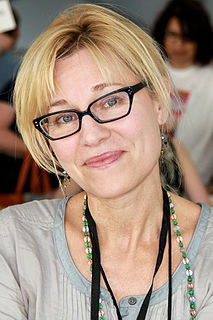A Quote by Benjamin Disraeli
I think that an author who speaks about his own books is almost as bad as a mother who talks about her own children.
Related Quotes
I like reading books about kids where there weren't really many adults, where they didn't need an adult to come and solve the problems for them. They could use their own ingenuity, use their own talents to solve whatever the issue was. And I like that still. I think that children want to read about heroic children. They don't want to read about children that have to be saved all the time.
I started reading Dickens when I was about 12, and I particularly liked all of the orphan books. I always liked books about young people who are left on their own with the world, and the four children's books I've written feature that very thing: children that are abandoned by their families or running away from their families or ignored by their families and having to grow up quicker than they should, like David Copperfield - having to be the hero of their own story.
I think of myself as a fairly logical, scientific and somewhat reserved person. Maura Isles, the Boston medical examiner who appears in five of my books, is me. Almost everything I use in describing her, from her taste in wine to her biographical data, is taken from my own family. Except I don't have a serial killer as a mother!
I don't think that children, if left to themselves, feel that there is an author behind a book, a somebody who wrote it. Grown-ups have fostered this quotient of identity, particularly teachers. Write a letter to your favorite author and so forth. When I was a child I never realized that there were authors behind books. Books were there as living things, with identities of their own.
Current conflicts and guilt about being a woman who is a mother and a person in her own right are a socially defined malaise, notan individual problem.... The conflict is not between being a mother and having a career; it is between nineteenth-century ideas about children and today's ideas about women.
The author with the greatest influence on me is my friend Stephen Harrigan, who critiques everything I write before I even bother to show it to my agent or editor. He's a truly great writer - author of Gates of the Alamo and other books you might know of, and his instincts about what's working in a story, and what's not, are just about perfect. My books would be very different without his influence.

































